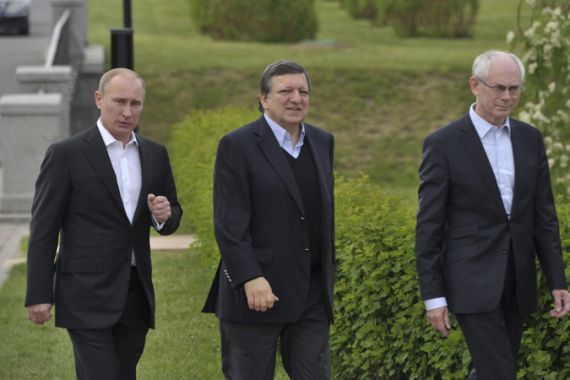EU officials pressure Russia over Syria
Top European Union officials meet Putin in Saint Petersburg, with Kremlin’s support for Damascus set to dominate agenda.

Vladimir Putin is meeting senior European Union officials for summit talks in Saint Petersburg, with the newly elected Russian president expected to come under pressure to harden his country’s stance on the Syrian crisis.
Official talks got under way on Monday at the Konstantinovsky Palace in the suburbs of the Baltic city, with EU leaders also expected to press Putin over its opposition to tougher action against Iran over its nuclear programme.
But the situation in Syria appeared likely to emerge as the sharpest point of contention, with Russia refusing to sanction tougher action against Damascus by using its veto powers on the UN Security Council.
Informal dinner
Putin met on Sunday evening Herman Van Rompuy and Jose Manuel Barroso, the presidents of the European Council and the European Commission respectively, for an informal dinner.
“We fully agree that the Annan plan as a whole provides the best opportunity to break the cycle of violence in Syria… avoiding a civil war,” Van Rompuy said after talks with Putin.
|
Despatch from Saint Petersburg The European and Russian officials assembled in Saint Petersburg agreed that they agree on what they’ve already agreed on. But it’s clear Russia and the EU are still poles apart on Syria. Kofi Annan’s frayed peace plan got the full support of both Russia and Europe. But EU hopes Moscow might use its leverage to push Assad to stop his crackdown, or that Russia could persuade Syria’s president to step down were swatted away. The summit in St Petersburg [Putin’s home town] was also a chance to talk business. Russia wants visa-free travel for its citizens in Europe. Europe wants Russia fully opened up for Western trade and investment. But Putin insists this relationship should be free of ideology and stereotypes. In short: we’ll do business with you but stop telling us what to do. – Rory Challands/Al Jazeera |
“We need to combine our efforts in order for this to happen.”
But Putin has so far displayed no sign that Moscow is preparing to abandon its Cold War-era ally, despite growing international condemnation of Syrian President Bashar al-Assad’s government over continued deadly violence in the country.
Russia’s foreign ministry has stated that the only way out of the crisis involves a cessation of violence and support for the peace plan of the UN-Arab League mediator, Kofi Annan.
“Russia will continue supporting this position and calls on other states to do the same,” it said.
The Kremlin has criticised the European Union sharply for imposing an oil embargo on Iran over its nuclear programme and argued that unilateral sanctions only diminish the chances of compromise from Iran.
Pressure is growing on Russia to push for a solution to the Syrian crisis, possibly involving Assad ceding power to his inner circle as part of a transition deal.
Political transition
Hillary Clinton, the US secretary of state, said on Sunday that she had “made it very clear” to Sergei Lavrov, the Russian foreign minister, in a phone call at the weekend that the focus was shifting to a political transition in Syria rather than talks with Assad’s regime.
China, which along with Russia has vetoed two UN Security Council resolutions criticising Assad’s government, strongly condemned last week’s massacre of more than 100 civilians in the Syrian town of Houla.
China’s top state newspaper on Monday warned against foreign action in Syria and said the abandonment of Annan’s peace plan could plunge the country “into the abyss of full-scale war”.
The commentary in the People’s Daily , the mouthpiece of the Communist Party, comes as Syrian troops continue to clash with rebels and casualties rise, prompting warnings of a full-scale civil war and raising the prospect of outside military action under a UN mandate.
“Mass civilian casualties, enormous property losses, an increasingly turbulent society … The lessons learnt from mistakes made in Libya are still fresh.”
It also said that “external forces are not qualified to meddle”.